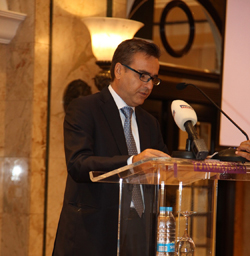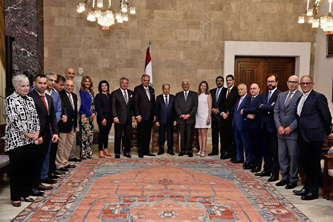
Introductory Remarks By Sarkis Seraydarian - Wast Management
Friday, September 1, 2017
Welcome to the Republic of Garbage. The trash crisis surfaced in July of 2015 when the Naameh landfill had to be shut down after eighteen years of so-called temporary use due to capacity issues and fierce public opposition.With the closing of Naameh, the government took a series of so-called waste management measures by dividing the country into six regions in an attempt to outsource waste management to the same waste collection company which operated since 1994 in the areas of Greater Beirut, Mount Lebanon and Keserwan, covering about four hundred municipalities and, may I point out, charging 150 USD per ton, one of the highest rates in the world and generating to the firm revenues estimated at more than 170 million USD per year.
Suspected by many that a sizeable chunk of these revenues were channeled through kickbacks to the ruling elite, the government cancelled the bids in favor of exporting waste. By early 2016, this overly expensive and disastrous scheme was dropped due to strong opposition by tens of thousands of activists after the revelation of details about corruption and falsification of documents.In March 2016, the four-year Chehayeb Plan was approved by the Council of Ministers. The plan entailed the construction of two coastal landfills in Bourj Hammoud (a northern Beirut suburb) and Costa Brava (a southern Beirut suburb) near the capital's airport.
The municipalities surrounding the new landfills received significant monetary incentives and the right to exploit the coastal landfilled areas. It is worth mentioning that the cost of the plan will amount to a staggering 528 million USD over four years. May I remind you that this is an exact repetition of the Normandy landfill during the Civil War which was transformed into an artificial coastline and became a profitable piece of land.Today the untreated waste of Beirut and Mount Lebanon is dumped in the above two coastal areas. In the case of Bourj Hammoud waste is thrown into the sea in violation of the most basic environmental norms. In the case of Costa Brava waste is disposed of in defiance of international civil aviation safety standards in the midst of very serious public health and environmental damage concerns. In a country known for its total lack of trust, transparency and credibility, we should not rule out the possibility of trash piling up again on the streets and riverbanks once capacity is reached in October 2018 as a result of over dumping.
Nationwide, with the exception of a few cases, open dump sites are on the rise ranging from 1000 to 3000 dumps in addition to many uncontrolled incineration sites, with horrific health, environmental and also economic consequences.The trash crises epitomize the rotten nature of the Lebanese political system and the willingness of the political establishment to bury the country with trash with the objective of extracting more resources from the taxpayer. It underlines how the ruling elites have intentionally manufactured a crisis due to their inability to agree on how to divide up the cake. Furthermore, it shows in day light the quasi collapse of state institutions and reliable public services. Lastly, it highlights the disaster of our confessional political system, the pervasiveness of blatant corruption, the prevalence of neo liberalist fraudulent practices and favoritism, the total absence of efficient management and the inexistence of long term planning. A prominent academic has gone so far as suggesting that the real crisis lies in the relationship between citizens and their state and not in waste management technical solutions.
As in the case of healthcare, water and electricity, among others, all of which are corrupted by patronage practices, it is imperative that a modus operandi change occurs. This begs the question: who will instigate that transformation and how in order for Lebanon to define a national strategy on how to deal with waste in general and determine the role and responsibilities of the three main stakeholders, namely the state, the service provider and the citizen who is receiver of the service.As indicated before the state has miserably failed in elaborating a policy framework that reflects sustainability, an unfortunate state of affairs exacerbated by the fragmentation of public authority between the Ministry of Interior and Municipalities, the CDR (Council for Development and Reconstruction), the Ministry of Environment, the Office of the Minister of State for Administrative Reform and the municipalities.
Owing to the absence of a unified, specific, coherent set of demands, change from the citizens or civil society has so far failed, at least on the face of it, after the country witnessed various cross-sectarian movements and grassroots initiatives rallying against the system and demanding transparency, inclusion, participation and more effective services. Perceived as a threat to the sectarian system, the government resorted to the use of water canons, rubber bullets, sound grenades and arbitrary arrests. Notwithstanding its weaknesses and shortcomings, the protest movement has produced new networks and alliances, resulting in a new activist landscape beyond and above sectarian or class considerations. The fact remains that there has been a shift in consciousness among the Lebanese population when it comes to environmental issues.Mr. Paul Abi Rached has been in the forefront of environmental education and is widely viewed as a leader as far as the promotion of environmental solutions for sustainable development is concerned. Holder of a law degree, Mr. Abi Rached is the founder and president of the NGO TERRE Liban, president of the Lebanese Ecological Movement which gathers some 60 NGOs and the author and composer of plethora of educational songs devoted to ecology.
Another ray of hope has been witnessed in the Metn town of Beit Mery, which has successfully implemented an innovative and comprehensive zero waste management program, the first of its kind in Lebanon amid a growing belief among the people of the Metn area that the resolution of the garbage crisis is not mission impossible.This project initiated by Mr. Roy Abou Chedid, in conjunction with a Lebanese environmental and industrial engineering organization Cedar Environmental, has completely eliminated municipal landfill waste. With the exception of medical and industrial by-products, all the waste produced in the town is either recycled or treated through sorting, composting and processing of recyclable materials. What is more is the fact that this new program is roughly 50% cheaper than the town's previous contract with the waste contractor for Beirut and Mount Lebanon, not to mention the fact that numerous jobs have been created in the process, along with the production of recycled materials and fertilizers for agriculture.
A firm believer that positive change can be accomplished, Mr. Abou Chedid was elected Mayor of Beit Mery in 2016, Holder of a law degree and a Masters in business law, Mr. Abou Chedid is a reputable law practioner, in addition to being member in several charitable and social organizations.I welcome our two panelists who will provide us insights into badly needed solutions.






